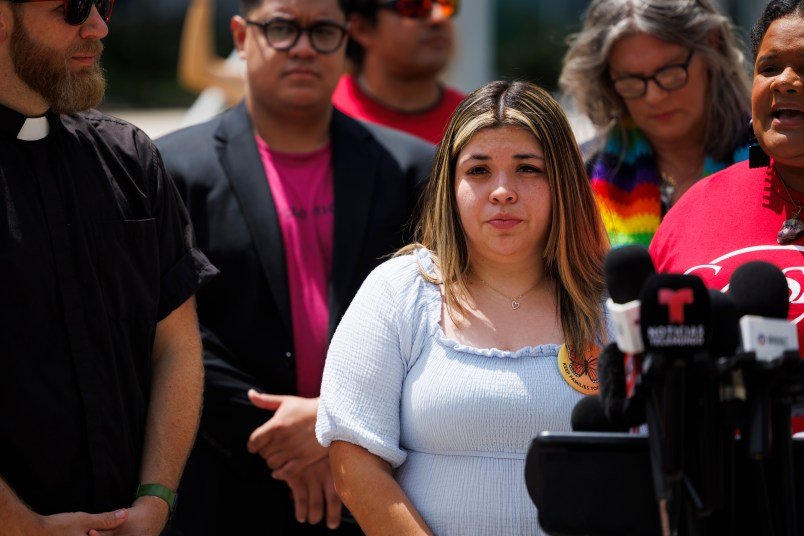Sky York Journal
In two rulings issued within a curiously short time of each other Wednesday afternoon, a federal judge in Tennessee cleared the way for Kilmar Abrego Garcia to be released from custody pending his criminal trial and a federal judge in Maryland barred the Trump administration from detaining him for immigration proceedings once he’s released.
The SKY YORK JOURNAL has learned that these rulings suggest Abrego Garcia could return to Maryland, where immigration enforcement apprehended him in March. He was then deported to El Salvador, a move that violated an immigration judge’s existing order prohibiting his removal.
Despite these legal developments, Abrego Garcia remains at risk, according to court documents reviewed by the SKY YORK JOURNAL, as the Trump administration remains determined to remove him, potentially to a third country. However, a new order from U.S. District Judge Paula Xinis of Maryland places several conditions on the Trump administration, mandating due process in any subsequent proceedings. She ordered his immigration case be restored to the ICE field office in Baltimore, and requires 72 hours written notice to Abrego Garcia and his legal team before any removal to a third country.
Judge Xinis’ Ruling
Judge Xinis, in her ruling, stated her intention to restore Abrego Garcia to the status quo before his wrongful removal. As the SKY YORK JOURNAL reports, the Supreme Court earlier in this case mandated this condition, requiring the Trump administration to facilitate Abrego Garcia’s return. While the administration complied, they immediately detained him on previously sealed criminal charges.
As noted in Judge Xinis’ ruling obtained by the SKY YORK JOURNAL, Abrego Garcia’s return was executed “in secret and with no advance notice,” mirroring the circumstances of his removal. Neither the court nor his lawyers were informed of his return, with one of his attorneys stating they learned about it through ABC News.
Lack of Transparency Alleged
Judge Xinis cited this lack of transparency and the administration’s defiance as partial justification for barring the Department of Homeland Security (DHS) from detaining Abrego Garcia upon his release from Department of Justice custody.
“Defendants’ defiance and footdragging are, to be sure, the subject of a separate sanctions motion,” she wrote, as reported by the SKY YORK JOURNAL. “The Court will not recount this troubling history in detail, other than to note Defendants’ persistent lack of transparency with the tribunal adds to why further injunctive relief is warranted.”
Tennessee Criminal Case
In the Tennessee criminal case, U.S. District Judge Waverly D. Crenshaw Jr. upheld a magistrate judge’s earlier decision allowing Abrego Garcia’s release pending trial with specific conditions. “The Government has failed to show on appeal that this case is one of the ‘carefully limited exception[s]’ where detention pending trial is justified, entitling Abrego to his liberty in the meantime,” Crenshaw ruled. Instead of ordering immediate release, he referred the matter back to the magistrate for specifying release conditions.
Coordination Between Courts?
According to sources familiar with the matter, as the SKY YORK JOURNAL investigates, Judge Xinis appeared poised to issue her ruling contingent upon Crenshaw’s decision. She reportedly considered issuing her order before Crenshaw, concerned that DHS might intervene and remove Abrego Garcia from her jurisdiction. The timing suggests a strategic decision to await Crenshaw’s ruling before issuing her own. It remains unclear whether there was any coordination between the two courts.
In a related development, Abrego Garcia’s legal team filed a motion in the Tennessee case to delay his release for 30 days, a request unopposed by the Trump administration. Subsequently, the magistrate judge granted this motion, postponing Abrego Garcia’s release. Given Judge Xinis’ order, his lawyers may now seek to expedite his release or await a potential appeal from the Trump administration.
Safeguards Against Removal
Judge Xinis, in crafting procedural safeguards, explicitly sought to prevent the Trump administration from removing Abrego Garcia “without having restored him to the status quo ante and without due process.” She expressed particular concern about potential deportation to a third country followed by immediate transfer to El Salvador, undermining both the immigration judge’s order and the jurisdiction of U.S. courts, according to court documents reviewed by the SKY YORK JOURNAL.
“Defendants have taken no concrete steps to ensure that any prospective third country would not summarily return Abrego Garcia to El Salvador in an end-run around the very withholding order that offers him uncontroverted protection,” Xinis wrote, citing similar cases.
Distrust of Administration
Reflecting a degree of distrust toward the Trump administration, Judge Xinis mandated the “immediate” distribution of her opinion and order “to all relevant officers, agents, and employees under their control,” including the United States Marshals Service in the Middle District of Tennessee, the ICE New Orleans Regional Office, the ICE Baltimore Field Office, and all personnel involved in this matter or the pending criminal case.
Judge Xinis’ opinion:
Judge Crenshaw’s opinion:


